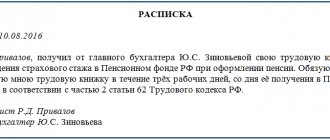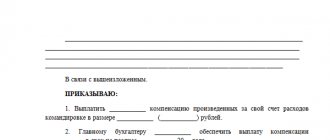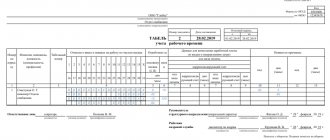When arranging an employee’s trip, the manager must take into account some current regulations. You should be aware that not all employees can be sent on a business trip, and certain categories of citizens must give their written consent to the planned activities.
Specialists who are in an employment relationship with an employer can be sent on a business trip to perform production tasks (Article 166 of the Labor Code of the Russian Federation), the solution of which can be done outside the place of permanent work. The lack of mention of another locality in labor legislation often creates the erroneous opinion that the performance of any production task outside the enterprise is recognized as a business trip. Performing duties in the same locality where the organization is geographically located is not such (the employee can return home every day).
Is it necessary to obtain consent from an employee for a business trip?
A signature on a business trip order should not be considered such consent. It only confirms the fact of familiarization with the management’s order. It is recommended to issue a separate document containing the following information:
- justification for the need to send an employee on a business trip;
- planned travel dates;
- notification of the employee’s right to refuse, indicating the reason in accordance with labor laws;
- guarantees and compensations that an employee is entitled to when sent on a business trip (for example, double pay for work on a day off);
- other information that the employer deems necessary.
It is also recommended to indicate language confirming that the employee is familiar with his right to refuse a business trip and expresses his consent or disagreement to the trip.
Is it necessary to obtain employees’ consent to be sent on a business trip?
Which employees can still be required to go on a business trip (even if they are against it)? If the employee does not belong to the categories of employees named above (who cannot be sent on business trips or who can be sent only with their written consent), then the employer is not obliged to ask the employee’s consent to go on a business trip. However, if such an employee refuses to go on a business trip, he must indicate his reason for refusal. And in this case, the employer has the right to decide whether to recognize the specified reason as valid or not.
In particular, reasons for which an employee has the right not to come to work are considered valid reasons. For example, illness, if an employee brings a certificate of incapacity for work (Article 183 of the Labor Code of the Russian Federation).
Sending on a business trip: step-by-step procedure
Labor Code, which says that if some conditions are not included in the employment contract, this does not make their fulfillment optional. To another city First of all, the manager must remember that there are a number of employees whom the law directly prohibits from sending on business trips. Even if they themselves are not against it, and the business trip is supposed to be within the same locality.
Whatever the production need, they cannot be sent on business under any circumstances: pregnant women Art. 259 Labor Code minor workers Art. 268 of the Labor Code, those employees with whom a student agreement has been concluded, Art. 203 Labor Code disabled people Law of November 24, 1995 No. 181-FZ, art. 23 In addition to such employees, there are those who have the right to refuse a proposed business trip, especially if it involves staying in another city.
An employee can be fired for refusing to travel
The employer should familiarize employees with the right to refuse a business trip. In addition to obtaining consent, the employer should familiarize the above-mentioned employees in writing with the right to refuse to be sent on a business trip.
This requirement is established by Article 259 of the Labor Code of the Russian Federation. For this purpose, a notice is drawn up in which the employee is explained his right. There is no specific form for such a document; it is drawn up in free form.
Attention The main thing is to indicate in it the details of the employee who is planned to be sent on a business trip, and information about the business trip.
An example of a notification to an employee with the right to refuse a business trip Limited Liability Company "Garantiya" LLC "Garantiya" To the contract department economist O.M. Koroleva. Notification of the right to refuse a business trip 02.22.2012 ref.
When do you need written consent for a business trip?
However, for this, the following very important conditions must be met: 1) if the organization has a local regulatory act that provides for the procedure for paying bonuses (for example, Regulations on remuneration, Regulations on bonuses for personnel); 2) and if this local regulatory act stipulates that one of the criteria for receiving a bonus is the employee’s compliance with labor discipline, internal labor regulations, and the absence of disciplinary sanctions in the period for which the bonus is paid. Confirmation: Art. 129, 135 of the Labor Code of the Russian Federation, letter of the Federal Tax Service of Russia No. KE-4-3/5165 dated April 1, 2011. Moreover, in this case, such a disciplinary offense as unjustified refusal to travel must be documented (for example, a memorandum from the immediate supervisor employee).
How to obtain an employee’s consent to a business trip with a child under 3 years old?
What measures does the employer have the right to take in the event of an employee’s unjustified refusal to travel? If an employee does not have valid reasons for refusing a business trip, but refuses to go on a business trip, then the employer has the right to apply the following measures.
Firstly, this can be regarded as a failure by the employee, through his fault, to fulfill his labor duties. And in relation to this offense, the employer has the right to apply disciplinary sanctions in accordance with the provisions of Art. 192, 193 of the Labor Code of the Russian Federation.
This position is also confirmed by judicial practice (for example, the Appeal ruling of the Tambov Regional Court dated June 18, 2012 in case No. 33-1549), which recognizes an employee’s unjustified refusal to travel as a disciplinary offense.
Disciplinary sanctions for this offense may include a reprimand or reprimand.
Cancellation of a business trip
As a general rule, labor legislation does not establish the obligation of the employer to ask the employee for consent to a business trip (whether it is a business trip in Russia or abroad).
However, for certain categories of workers, the provisions of the Labor Code of the Russian Federation establish restrictions for sending them on business trips.
Who can't be sent on a business trip? You cannot send on a business trip: - a pregnant woman (Part.
1 tbsp. 259 of the Labor Code of the Russian Federation); - an employee under the age of eighteen. Exceptions: creative workers of the media, cinematography organizations, television and video crews, theaters, theatrical and concert organizations, circuses, athletes.
What you need to know about business trips
Source: //advocatus54.ru/nuzhno-li-brat-soglasie-s-rabotnika-na-komandirovku/
Revocation order
The recall of an employee from vacation must be formalized by a personnel order. It can be issued in the form accepted by the organization (there is no standard form for such orders).
The order must indicate:
- Full name and position of the employee;
- the date from which he was recalled from leave;
- transfer dates, if indicated in the consent.
Sample order for recall from vacation due to a business trip
Alpha Beta LLC
April 9, 2021
ORDER No. 01013-k
About vacation recall
Due to the production necessity of sending accountant A.I. Sidorova on a business trip. and subject to her consent:
I ORDER:
- Terminate on April 10, 2021 the annual paid leave of accountant A.I. Sidorova, granted to her according to the approved vacation schedule from April 1, 2021 to April 15, 2020.
- Accountant Sidorova A.I. start work on April 10, 2020.
- The unused part of the annual paid leave in the amount of 5 calendar days shall be provided to A.I. Sidorova. According to her statement, from June 1, 2021.
- I reserve control over the execution of this order.
Reason: memo from the chief accountant N.P. Petrova. dated April 7, 2021, consent of accountant Sidorova A.I. dated April 8, 2021.
General Director /signature/
Making changes to personnel documents
Calling an employee back from vacation will require changes to the vacation schedule and the employee’s personal card.
In the vacation schedule, changes in dates are reflected in column 10 “Notes”. It must indicate that the recall from vacation occurred on the basis of the relevant order and enter the date from which the employee actually began work.
The new date, if determined by the employee, is also indicated in the schedule.
In the employee’s personal card, information about the transfer must be reflected in section VIII of the form approved by Resolution of the State Statistics Committee of Russia dated January 5, 2001 No. 1.
The working time sheet reflects information about the actual days worked by the employee:
- rest days o or “09”;
- days for which the employee was recalled, o or “01”.
The subsequent assignment of an employee on a business trip is formalized in the usual manner (more about this here).
Is it necessary to obtain employees’ consent to be sent on a business trip?
A business trip is a trip of employees by order of the employer for a certain period of time to fulfill an official assignment outside the place of permanent work (Article 166 of the Labor Code of the Russian Federation). Employees who have an employment relationship with the employer are sent on business trips. Does the employer need to obtain the employee’s consent to send him on a business trip?
Which employees need to obtain consent to be sent on a business trip?
Sending employees on business trips is common practice for many employers. And, sending employees on business trips to various regions, many employers forget that labor legislation defines a list of persons whose consent must be obtained when sending them on business trips.
Thus, the Labor Code of the Russian Federation requires obtaining consent from the following employees:
• women with children under the age of three (Article 259 of the Labor Code of the Russian Federation); • mothers and fathers raising children under the age of five without a spouse (Article 259 of the Labor Code of the Russian Federation); • workers with disabled children (Article 259 of the Labor Code of the Russian Federation);• workers caring for sick members of their families in accordance with a medical report (Article 259 of the Labor Code of the Russian Federation);• fathers raising children without a mother (Articles 259, 264 of the Labor Code of the Russian Federation);
• guardians (trustees) of minors (Articles 259, 264 of the Labor Code of the Russian Federation).
The employer should inform employees of the right to refuse a business trip
In addition to obtaining consent, the employer should inform the above-mentioned employees in writing of the right to refuse to be sent on a business trip. This requirement is established by Article 259 of the Labor Code of the Russian Federation.
To do this, a notice is drawn up explaining to the employee his right. There is no specific form for such a document; it is drawn up in free form.
The main thing is to indicate in it the details of the employee who is planned to be sent on a business trip, and information about the business trip.
An example of a notification to an employee with the right to refuse a business trip
Limited Liability Company "Garantiya" LLC "Garantiya"
Economist of the contract department O.M. Koroleva
Notice of the right to refuse a business trip
02/22/2012 ref. No. 35
Dear Oksana Mikhailovna!
Due to the need to negotiate with Delivery LLC on concluding agreements for the supply of goods, I propose to send you on a business trip to Tver from February 28 to March 5, 2012.
At the same time, I notify you that in accordance with Article 259 of the Labor Code of the Russian Federation, you, as a woman with a child under three years of age, have the right to refuse a business trip.
Please notify the HR department of your consent or disagreement to go on a business trip by February 27, 2012.
General Director Mikhailov L.I. Mikhailov
I am familiar with the right to refuse a business trip. I don't mind the trip.
02/22/2012 Koroleva O.M. Queen
There is a ban on business trips
The legislation prohibits sending a number of employees on business trips. Thus, an unconditional ban on sending pregnant women on business trips is established (Article 259 of the Labor Code of the Russian Federation).
They cannot be sent on business trips even with their consent.
It is also impossible to send workers under the age of 18 on a business trip, with some exceptions (Article 268 of the Labor Code of the Russian Federation) and workers with whom an apprenticeship agreement has been concluded, if the business trip is not related to apprenticeship (Part 3 of Article 203 of the Labor Code of the Russian Federation).
Note!
Refusal of this category of employees to go on a business trip is not a disciplinary offense and cannot entail the imposition of a disciplinary sanction.
Do you already know about the free e-newsletter “Expert Advice from A to Z”? Instead of reading hundreds of articles on topics that interest you or searching for them on your own through information services, sign up for a free newsletter from our experts about the most important events and trends » Subscribe now for free! "
Source: //www.experto24.ru/pravo/trudovoe-pravo/nuzhno-li-poluchat-soglasie-rabotnikov-na-napravlenie-v-komandirovku.html
Common mistakes
Error: A university student, who also works at the enterprise, was sent on a business trip.
Comment: It is prohibited to send students of higher and secondary educational institutions on a business trip unless the employee has given his written consent.
Error: A minor employee was sent on a business trip.
Comment: Workers under 18 years of age are prohibited from being sent on business trips, even with their written consent.
Is it necessary to write the employee’s consent in the business trip order?
In addition, the organization may draw up a job assignment, which is currently used by organizations at their discretion. It can also be used as one of the sources for forming an order.
Whatever the basis for this document, the responsible person can use a company letterhead or a specialized form, the unified form T-9.
Attention! The form of the business trip order must be recorded in the accounting policy of the enterprise or the Regulations on business trips, which can be issued in the organization.
business trip order and sample filling in 2021 Order form T-9 for one employee of the business trip order free of charge in Word format. order in T-9 form in Excel format. Order for a business trip in 2021 sample free download in Pdf format.
Important
Otherwise, the employer will face administrative liability under Part 1 of Art. 5.27 of the Code of Administrative Offenses of the Russian Federation for failure to provide guarantees provided for by labor legislation. For legal entities, the punishment is quite significant - a fine from thirty to fifty thousand rubles.
Therefore, it is more profitable to know the norms of labor law and not violate them. Documentation of a business trip So, if an employee’s trip meets the considered criteria for a business trip, it must be properly documented so that payments to the employee and expenses associated with such a trip are justified. The procedure for documenting business trips is usually established in the relevant local act, for example, in the Regulations on Business Travel.
Order to send an employee on a business trip using form T-9
Let us note three cases when a business trip can be carried out on a weekend:
- if the employee is sent to perform work duties on such a day;
- the day off coincides with the time the employee is on the way to the place of business trip;
- The duration of the business trip is more than one week.
Let's consider in what cases a business trip day will be counted as a working day:
- In the first case, the day will be a working day, since the employee will carry out a direct order from management and perform a specific official task.
- In the second case, the day will also be counted as a working day, since the travel time to the place of business trip refers to working time.
Registration If an employee is on a business trip, the duration of which coincides with the weekend, it is necessary to correctly complete this procedure.
We organize business trips in a new way
Source: //tk-advokat.ru/2021/04/18/nado-li-v-prikaze-na-komandirovku-pisat-soglasie-rabotnika/
Business trip application
According to the Labor Code of the Russian Federation, Article 166, a business trip is a business trip to which an employee is sent. He is given a specific goal and a deadline for its implementation.
For employees whose main work is traveling, such trips are not considered business trips.
All business trips are regulated by Regulation No. 749 “On sending on a business trip” dated October 13, 2008.
Decree of the Government of the Russian Federation of October 13, 2008 N 749
Travel expenses can only be reimbursed for officially employed employees. Accordingly, a business trip order must be issued, a travel certificate and a service assignment issued.
In some cases, an employee’s application for a business trip is required.
In what cases is it required?
In the modern world, despite the advent of electronic signatures and the move away from paper, personal presence is still important and necessary - for example, concluding new transactions, transferring documentation, monitoring construction, etc.
The application for a business trip must be written personally by the employee sent on the business trip.
The HR specialist must know exactly how a business trip application is drawn up (a sample can be provided upon request), who should write it and in what form.
The document is drawn up in a standard application form. It is written to the name of the manager, from whom, the text of the application, date and signature. The text of the application indicates consent to the business trip, thereby familiarizing the employee with what he knows about a possible refusal.
Usually, when sending an employee on a business trip, his consent is not required.
According to the Labor Code of the Russian Federation, there are certain categories of citizens who must give their consent.
If they are unwilling or unable to go on a trip, the manager does not have the right to arrange a business trip. In case of violation, a fine is imposed on the manager and the organization.
The Labor Code of the Russian Federation, Article 259 and Article 264, specifies categories of people who require additional protection.
Labor Code of the Russian Federation
List of employees who cannot be sent on a business trip without an application from them:
- employees who have dependent children with disabilities or children under 3 years of age;
- employees who have dependent parents or other relatives;
- employees who alone raise children under 5 years of age.
You should also provide a list of employees who are prohibited from being sent on business trips:
- employees under 18 years of age;
- pregnant women;
- employees working under an apprenticeship contract;
- employees working under a civil contract.
Employees who are not on this list are not required to apply for a business trip.
An application for a business trip should not be confused with an application for travel expenses.
The latter is drawn up if you want to receive an advance for travel-related expenses. After writing it, the accounting department issues the money. Upon arrival, the employee is required to report on expenses incurred, providing supporting documents.
Applications for a business trip conventionally include all applications that were drawn up during the trip period: return ahead of schedule, return of unspent funds from wages, etc.
Trip at the expense of the host party
According to the Labor Code of the Russian Federation, all travel expenses of an employee are subject to reimbursement.
They consist of costs to the location of the business trip, accommodation, food and expenses associated with the business trip. Both the sending organization and the receiving organization can reimburse the costs incurred.
Before an employee is dispatched, both parties must enter into a written agreement. It indicates which organization is paying and for what travel expenses.
When drawing up an order for an employee’s business trip, it is indicated that the payment of travel expenses is made by the receiving party.
Payment will be made only after providing documents confirming the expenses.
When drawing up a business trip order, the employee must write a statement. The document must indicate that the employee requests to be sent on a business trip at the expense of the receiving party.
Traveling by private transport
When choosing transport to travel to the destination of a business trip, there are no strict frameworks specified in the Labor Code of the Russian Federation or the Tax Code of the Russian Federation.
It is necessary to coordinate this issue with the head of the enterprise. This could be by train, bus, air or car. The director will choose the most financially advantageous or convenient.
When traveling on a business trip by personal vehicle, gasoline costs can be taken into account as part of travel expenses.
To do this, the employee must provide a vehicle title confirming that he is the owner of the car. Then write a statement about your desire to go on a business trip by car.
The accounting department issues a corresponding order.
From practice: an enterprise draws up an agreement under which it rents a car from an employee. Based on it, the employee goes on a business trip by car, and gasoline expenses can be accepted for tax purposes. Upon return, a waybill is filled out and cash receipts for refueling are attached to the travel certificate.
Document requirements
The document can be typed on a computer or written by hand. In the first option, the date and signature must be affixed manually by the applicant.
Form and text
The form consists of a header, text and conclusion:
- The header indicates who and from whom the application was made.
- The text itself is written in the text.
- The conclusion includes the date of preparation and signature of the employee.
How to fill out the application:
- The “to” line indicates the position (manager, general director), last name, initials and name of the organization.
- In the line “from” the position and surname and initials of the employee are indicated.
- The body of the application indicates the title “Application for business trip” and then the text. An example of a statement is given below.
- The text of the application is followed by the date and signature of the employee sent on a business trip. Last name and initials are indicated in brackets.
date
The travel certificate indicates the date of departure of the employee by transport. A business trip application is written a few days before the trip.
The order is issued only after the application has been accepted and registered.
Example (sample) document:
Sample text of the application
How to write an application for travel expenses?
An application is drawn up to receive funds for travel expenses.
Dates
A business trip application is made several days before the business trip.
If the payment is made on the day of the trip, the employee will not have time to receive advance funds.
Example (sample):
Application for travel expenses
Thus, when sending an employee on a business trip from a certain category of persons, it is necessary to obtain an application from him. In it, he indicates that he agrees to go on the trip and is aware of the possibility of refusal.
When the manager approves the application for travel expenses, the accounting department transfers the requested amount. After arriving from a business trip, you must document the expenses incurred.
Attention!
- Due to frequent changes in legislation, information sometimes becomes outdated faster than we can update it on the website.
- All cases are very individual and depend on many factors. Basic information does not guarantee a solution to your specific problems.
That's why FREE expert consultants work for you around the clock!
APPLICATIONS AND CALLS ARE ACCEPTED 24/7 and 7 days a week.
Source: //kadriruem.ru/zajavlenie-na-komandirovku-obrazec/
Can they be sent on a business trip without the employee’s consent - sample applications
> Labor law > Business trip > Sample documents > Can they be sent on a business trip without the employee’s consent - sample applications
A business trip is a work trip on which an employer can send an employee if necessary.
When formalizing this process, as well as when appointing a traveling employee, the manager must take into account certain rules.
In particular, the employer should remember that not every specialist can be sent on a business trip.
Some workers can be sent on travel only after obtaining their official consent.
According to the rules of labor legislation established in the Russian Federation, an employer can send an employee who meets certain criteria on a work trip.
When going on a business trip, the management of the enterprise must take into account the rules specified in the rules. Otherwise, the employer’s actions will be contrary to current legislation.
The list of workers for whom it is important to obtain their written consent for sending on a business trip is determined by the Labor Code of the Russian Federation. This list includes:
- women with children under 3 years of age;
- parents (mother or father) raising a child under 5 years of age alone;
- parents of children with disabilities;
- workers caring for sick close relatives (if necessary according to medical indications);
- single fathers;
- guardians of minor children.
Information regarding restrictions of this nature is reflected in several articles of the Labor Code of the Russian Federation. In particular, in articles 259, 264 and 268.
Can an employer send an employee to another city if he does not agree?
The possibility of sending an employee on a business trip must be stated in the employment contract concluded with the employee upon his employment.
If such a point is present in the agreement, the specialist does not have the right to refuse a work trip.
It should be noted that this rule does not apply to workers who can be sent on a business trip only with their written consent. Such employees cannot be sent on a work trip without their consent.
If their rights are violated, workers included in the exception category can seek help from the labor inspectorate.
Employees who are not subject to the requirement to obtain consent for business travel may be sent on it legally.
In order to refuse the employer, the worker will have to provide compelling reasons why he cannot go on a trip.
The final decision is made by the manager independently. To summarize, we can draw a certain conclusion.
The latter includes mothers of young children, fathers raising children on their own, parents of disabled children, etc.
How to apply when leaving on a trip on a weekend?
Situations may arise in which a business trip falls on a weekend. In such cases, both parties to the employment relationship must be guided by the rules of the relevant legislation.
Part 2 of Article 113 of the Labor Code of the Russian Federation states that if a work trip is planned on weekends, an employee can be sent on it only with his written consent .
The worker is not obliged to go on a business trip during his legal vacation, and therefore has every right to refuse the trip.
An exception is the circumstances described in the 3rd part of Article 113.
It states that in the event of emergencies and emergency situations, the employee may be sent on a business trip forcibly.
An unjustified refusal by an employee may be considered a violation of industrial discipline, for which the employer has the right to impose a disciplinary sanction on him.
It is important to consider that if the day off falls in the middle of a business trip, there is no need for the worker to obtain consent. The latter is only necessary if the weekend falls on the days of departure to the destination.
Written consent is drawn up in free form . It may be presented in the form of a statement. The document reflects the following data:
- information about the employer;
- position and full name of the compiler;
- Title of the document;
- the main essence of the paper is that the employee agrees to travel on a day off;
- date of work trip, duration;
- a note indicating that the employee is aware of the possibility of refusing a business trip;
- date of registration of consent;
- personal signature of the employee.
The employee may also reflect in his agreement the point regarding remuneration for working on weekends. For example, what does he want to receive - double pay or time off.
Consent, which can be issued in the form of a statement, does not have a unified form.
This is what the sample looks like:
Registration if there is a child under 3 years old
A woman who has a child under 3 years of age may refuse a work trip.
If she does not mind going on a business trip, she issues written consent.
You should also make sure that the girl has no medical contraindications that prevent her from going on a trip.
The employer must first notify the worker in writing that she has the right to refuse .
This rule is regulated by Article 259 of the Labor Code of the Russian Federation. The employee’s consent is issued in any form - in the form of a statement.
conclusions
Only certain categories of working citizens can be sent on business trips. There are employees whose work trips are possible only with their consent.
The application must be made in writing, in any form. It must contain a note indicating that the employee knows that he has the right to refuse the trip.
The document must contain the personal signature of the worker and the date of execution.
Source: //azbukaprav.com/trudovoe-pravo/komandirovka/obraztsy-dokumentov/soglasie-obrazetc.html
Does an employee have the right to refuse a business trip?
In most cases, the employee is not given the right to refuse an upcoming business trip.
You might be interested in:
An employee took a taxi on a business trip - is it possible to deduct these expenses?
According to the norms, it is considered part of the performance of his job duties. If he refuses it, the employer may regard this as failure to fulfill official duties, and the employee may be subject to disciplinary action, including termination of the employment agreement.
Therefore, can an employee refuse a business trip? No. If he does not belong to preferential categories of workers, then he does not have the right to refuse trips. The only way for him to refuse the trip is to contact his employer to persuade him.
Valid reasons for refusal
Do not forget that at the time of refusal there may be valid reasons why the employee refuses to his management.
For family reasons
An employee will be able to refuse to travel on company business if he currently has family circumstances. For example, the birth of a child, the death of a close relative or his marriage.
According to the norms, he can take leave at his own expense, and the employer, by law, will have to arrange it. With the employer's permission, you can refuse a business trip if the employee has an anniversary planned during this period.
Important! However, this is the employer’s right, and not an obligation - he has the right to refuse a request to cancel or reschedule a trip.
If you have minor children
As such, the presence of a small child cannot be a reason for refusing to go on a business trip. The same applies to fathers with many children.
But at the same time, an employee may fall into one of the groups with mandatory written consent:
- Single parent with a child under 5 years of age;
- A parent caring for a disabled child;
- Guardian of a minor child;
- An employee caring for a sick family member (child).
Attention! In all these situations, the employee must be notified of the trip in advance, and also informed of the opportunity to refuse it.
If the employee's wife is pregnant
A pregnant wife may be the reason for the future father's refusal to go on a business trip. However, this is only a reason, and you cannot officially refuse to go, since the law does not provide for such a possibility.
There is a small loophole by which the specified reason can be transferred to a different status - obtain a certificate from a medical institution stating that the pregnant wife requires constant care, and the husband is providing it. Then you can refuse the trip without consequences due to the presence of a sick relative.
Other reasons
The following events may also be accepted as valid reasons:
- The occurrence of an emergency that affected the employee’s life;
- Urgency of receiving any document;
- An important event in the life of a family.
Attention! In each of these situations, it is necessary to provide supporting documentation.
For health
An employee may refuse to travel if he needs to undergo treatment or has medical contraindications. To do this, you must fill out an application indicating the reason. Supporting documents must be attached to the application - a doctor’s certificate, a copy of the sick leave certificate, etc.
Insufficient funds allocated for the trip
Before the start of the trip, the employer must provide the employee with funds to pay for travel, accommodation, and other expenses. An approximate calculation is made by an accountant and agreed with the responsible persons.
If the funds provided are insufficient, and the employee can prove this (for example, calculate the indicator based on the data available to him), then he can refuse the trip, since he is not obliged to finance the trip from his own funds.
However, the fact that the funds provided are insufficient will need to be carefully justified.
Travel allowances were not paid
The employer is obliged to provide funds to finance expenses during a business trip. If this kind of payment is not made before departure for the trip, then the employee has the right to refuse the business trip.
This is due to the fact that by law he has the right not to spend his own funds. It will not be possible to impose disciplinary punishment on him in this situation.
[DOC] Download Employee Consent for Business Travel - sample, form, template for Kazakhstan
In accordance with the Labor Code of 2007, in order to send certain categories of workers on a business trip, it was necessary to obtain their written consent to travel (this information is set out in more detail below in this description).
In accordance with the Labor Code of 2021, there are no exceptions for certain categories of workers when sent on a business trip, that is, any employee can be sent on a business trip, subject to the requirements of paragraphs 4 and 5 of Article 127 of the Labor Code of the Republic of Kazakhstan. In this case, the following have the right to refuse to be sent on a business trip:
- employees under eighteen years of age;
- pregnant women;
- disabled workers;
- workers with children under three years of age;
- employees caring for sick family members or raising disabled children, if, based on a medical report, disabled children or sick family members need constant care.
From the above it follows that the employee’s consent to travel in accordance with the Labor Code of 2021 is not required, therefore this document is not relevant.
Situation in which the employee’s consent to travel is applicable:
You are an Employee and you agree to be sent on a business trip to perform job duties for a certain period of time outside your permanent place of work, or on a business trip to another location for training, advanced training or retraining.
When traveling on business, the Employee must remember that:
- An employer does not have the right to send on a business trip:
- Workers under eighteen years of age;
- The employer does not have the right to send on a business trip without written consent:
- women with children under the age of seven, and other persons raising children under the age of seven without a mother;
- Workers caring for sick family members or raising disabled children, if, based on a medical report, children under three years of age, disabled children or sick family members need constant care.
- Disabled workers may be sent on business trips only with their written consent, unless such work is prohibited for medical reasons.
- The Employee’s written consent can be drawn up both on the Service Note on the Business Trip and in the form of a separate document – Employee Consent to the Business Trip.
- During the business trip, the Employee retains his place of work (position) and salary.
The procedure for sending Employees on business trips and official trips:
- The conditions and terms of sending Employees on business trips are determined by labor, collective agreements or an act of the Employer (for example, Regulations on Business Travel).
- Employees are sent on business trips to perform work duties for a certain period of time outside their place of permanent work or to another location for training, advanced training or retraining.
- Sending an Employee on a business trip is formalized by an Order on sending on a business trip.
- When an Employee is sent on a business trip, he is issued a Travel Certificate, and, if necessary, a Business Assignment for a business trip.
- At the end of the business trip, the Employer has the right to require the Employee to fill out a Report on the completion of the official assignment for the business trip, which will reflect information about the work performed during the business trip and the results of completing the official assignment.
- In accordance with Article 152 of the Labor Code of the Republic of Kazakhstan, Employees sent on business trips are paid:
- daily allowances for calendar days of being on a business trip, including travel time;
- travel expenses to and from your destination;
- living expenses.
- Before leaving on a business trip, the posted Employee is given a cash advance within the limits of the amounts due to pay travel expenses. Upon returning from a business trip, the Employee must, in the manner and within the time limits established by the Employer’s act, submit an advance report on the actual expenses of funds and documents confirming the expenses incurred.
The employee’s consent to business travel is developed in accordance with and taking into account the provisions of the following regulatory legal acts:
- Articles 152, 183, 187, 226 of the Labor Code of the Republic of Kazakhstan;
Source: //dogovor24.kz/documents/soglasie_rabotnika_na_komandirovanie-758.html
Does the employer need to obtain written consent from the employee for a business trip?
Menu
– Financial law – Does the employer need to obtain the employee’s written consent for a business trip?
Which employees can still be required to go on a business trip (even if they are against it)? If the employee does not belong to the categories of employees named above (who cannot be sent on business trips or who can be sent only with their written consent), then the employer is not obliged to ask the employee’s consent to go on a business trip.
However, if such an employee refuses to go on a business trip, he must indicate his reason for refusal. And in this case, the employer has the right to decide whether to recognize the specified reason as valid or not. In particular, reasons for which an employee has the right not to come to work are considered valid reasons.
For example, illness, if an employee brings a certificate of incapacity for work (Article 183 of the Labor Code of the Russian Federation).
Do I need employee consent for a business trip?
Attention: A business trip is a trip of employees by order of the employer for a certain period of time to fulfill an official assignment outside the place of permanent work (Article 166 of the Labor Code of the Russian Federation). Employees who have an employment relationship with the employer are sent on business trips.
Does the employer need to obtain the employee’s consent to send him on a business trip? Which employees need to obtain consent to be sent on a business trip? Sending employees on business trips is common practice for many employers.
And, sending employees on business trips to various regions, many employers forget that labor legislation defines a list of persons whose consent must be obtained when sending them on business trips.
Features for a foreigner
Sending foreign citizens working in Russia on a business trip has its own nuances. The work activity of a foreigner is limited by the conditions of the issued work permit. Therefore, as a general rule, an employer cannot send a foreigner on a business trip outside the constituent entity of the Russian Federation to which the work permit applies. But there are some exceptions.
Foreign workers may be on a business trip in another region if they are highly qualified specialists who have received a work permit in a special manner. The period of their continuous absence should not exceed 30 calendar days per year during the validity period of the permit.
For foreign workers who are not HQS, the business trip conditions are:
- an indication of the position (profession) of such an employee in the list of cases of carrying out labor activities outside the boundaries of the subject of the Federation in the territory of which the work permit was issued, which is given in the Appendix to the Order of the Ministry of Health and Social Development of July 28, 2010 No. 564n;
- compliance with travel duration restrictions. For temporarily residing foreigners, the deadline is 40 calendar days within 12 months; for those temporarily staying in the territory of the Russian Federation - no more than 10 calendar days during the period of the work permit. A foreigner temporarily staying in the Russian Federation may be away for no more than 10 days during the validity period of his work permit.










